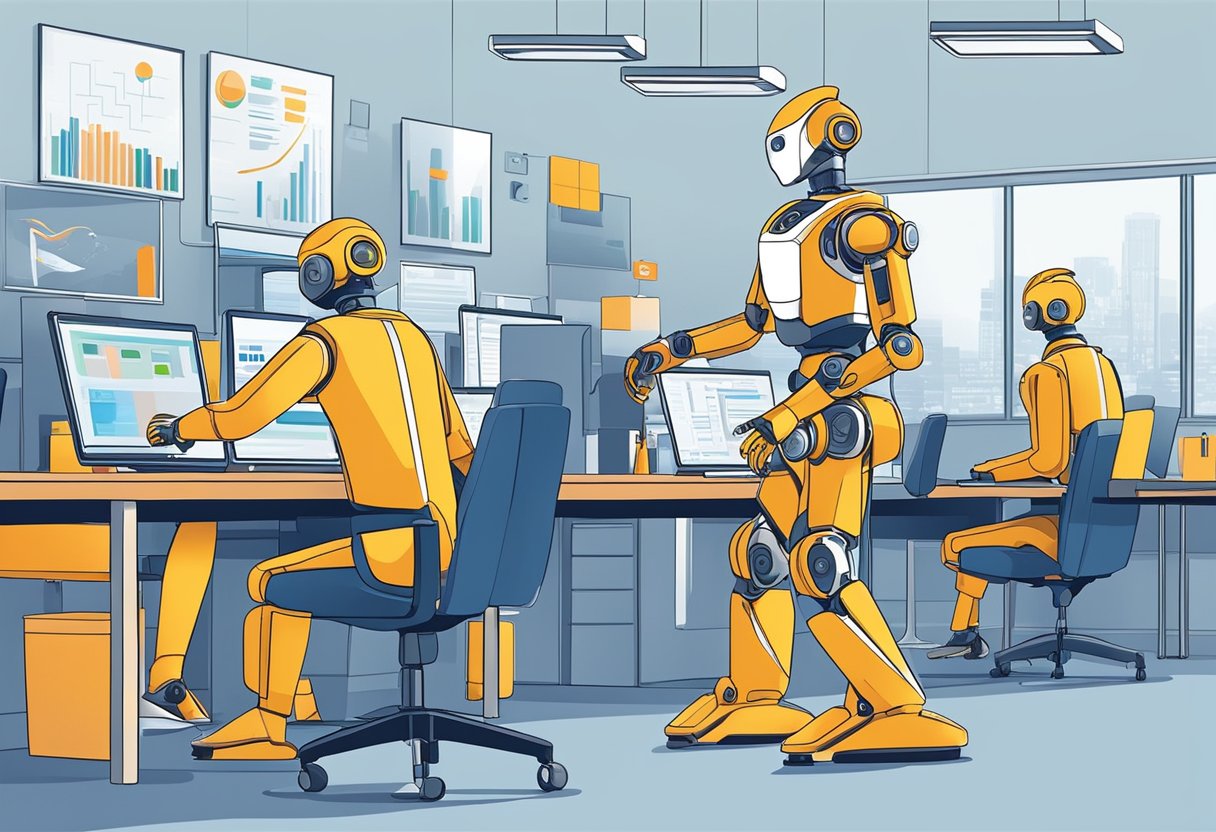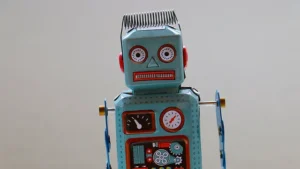Artificial Intelligence (AI) has been a hot topic in recent years, with its impact on jobs and organizations being a major concern. Many experts believe that AI will change the way we work, and organizations will need to adapt to stay competitive. With the rapid advancements in AI technology, it is important to understand how it will affect the workforce and what changes can be expected.
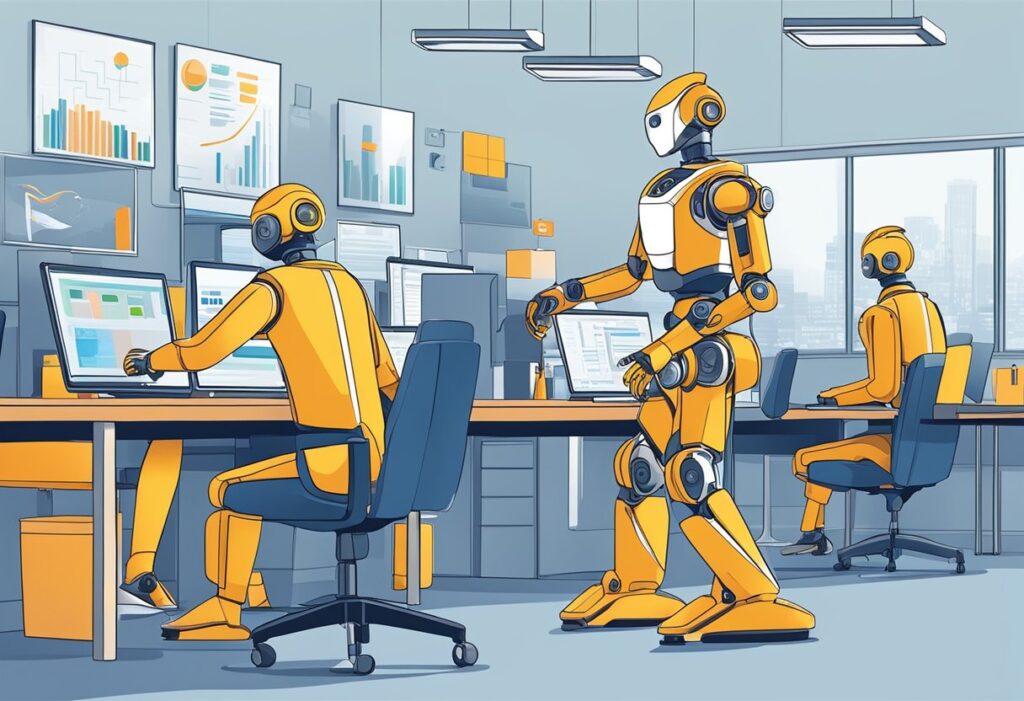
AI is expected to have a significant impact on the job market in the coming years. According to a report by the McKinsey Global Institute, up to 375 million workers may need to switch occupations or acquire new skills by 2030 due to the adoption of AI and other technologies. While some jobs may be automated, new jobs will also be created, requiring workers with different skills and expertise. It is important for individuals and organizations to prepare for these changes in order to stay competitive in the job market.
AI will also change the way organizations operate. With the ability to process large amounts of data quickly and accurately, AI can help organizations make better decisions and improve efficiency. Automation of tasks and processes will also lead to cost savings and increased productivity. However, organizations will need to ensure that they have the necessary infrastructure and expertise to implement AI effectively.
Fundamentals of AI in the Workplace

Defining Artificial Intelligence
Artificial Intelligence (AI) is a field of computer science that aims to develop machines that can perform tasks that typically require human intelligence, such as perception, reasoning, learning, and decision-making. AI systems use algorithms and statistical models to analyze data, identify patterns, and make predictions. In the workplace, AI can be used to automate routine tasks, improve decision-making, and enhance productivity.
AI’s Role in Modern Organizations
AI is becoming increasingly important in modern organizations. According to a survey conducted by the World Economic Forum, nearly half of companies expect adopting AI to create jobs, well ahead of the 23% of respondents who expect it to displace jobs. AI can help organizations to improve efficiency, reduce costs, and increase revenue. For example, AI-powered chatbots can handle customer inquiries, freeing up human agents to focus on more complex tasks. AI can also help organizations to identify new business opportunities and improve customer experience.
AI can also help organizations to make better decisions by providing insights based on large amounts of data. For example, AI can be used to analyze customer behavior, market trends, and competitor activity, enabling organizations to make more informed decisions. AI can also help organizations to identify potential risks and opportunities, allowing them to take proactive measures to mitigate risks and capitalize on opportunities.
In conclusion, AI is transforming the workplace by automating routine tasks, improving decision-making, and enhancing productivity. While there are concerns about the impact of AI on jobs, many organizations believe that AI will create new job opportunities and help them to remain competitive in a rapidly changing business environment.
Impact on Employment
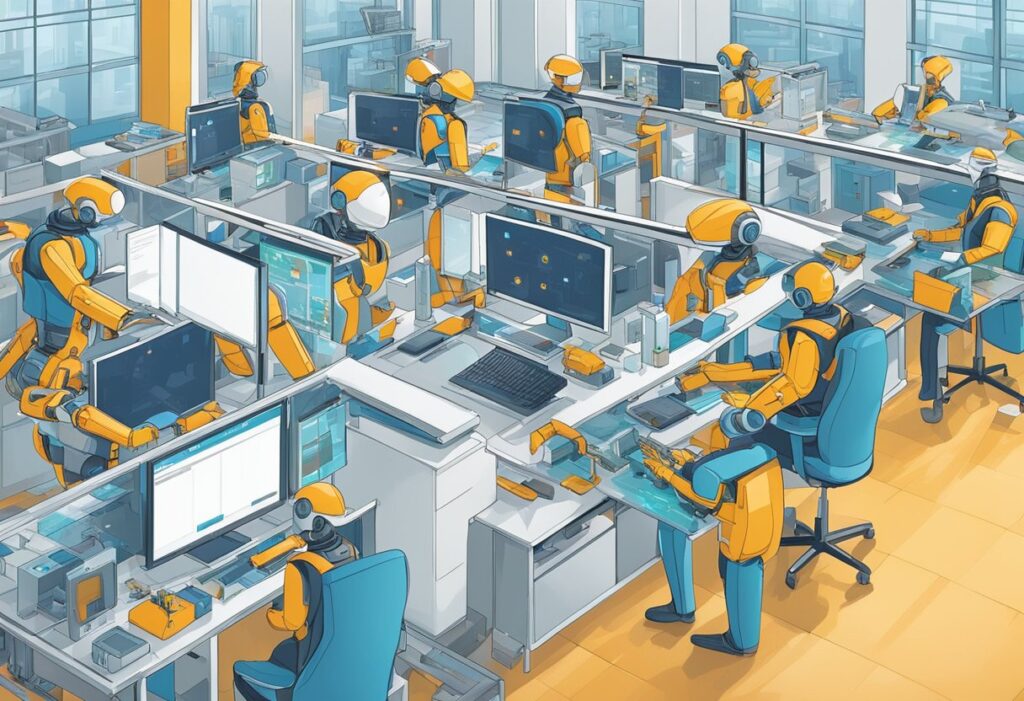
As AI continues to grow and evolve, it is expected to have a significant impact on employment. While some jobs may be at risk of being displaced by AI, there will also be new opportunities and roles created.
Job Displacement Risks
AI is expected to automate many routine and repetitive tasks, which may lead to job displacement in certain industries. According to a Forbes article, jobs in industries such as transportation, manufacturing, and customer service may be at risk. However, it is important to note that not all jobs in these industries will be displaced, and new roles may emerge as a result of AI.
To mitigate the risks of job displacement, organizations may need to invest in reskilling and upskilling their employees. This can help employees adapt to the changing job market and take advantage of new opportunities created by AI. Additionally, organizations may need to rethink their hiring strategies to ensure they are hiring individuals with the skills and experience needed to work alongside AI.
New Opportunities and Roles
While some jobs may be at risk of being displaced by AI, there will also be new opportunities and roles created. According to a World Economic Forum article, AI is expected to drive job creation in the coming years. Nearly half of the companies surveyed expect AI to create jobs, while only a small percentage expect it to displace jobs.
New roles created by AI may include data analysts, machine learning engineers, and AI ethicists. These roles will require individuals with specialized skills and knowledge, and may offer higher salaries than the jobs they replace. Additionally, AI may enable individuals to work more efficiently and effectively, freeing up time for more creative and innovative work.
In conclusion, while AI may lead to job displacement in certain industries, it is important to remember that it will also create new opportunities and roles. Organizations and individuals will need to adapt to the changing job market and invest in reskilling and upskilling to take advantage of these opportunities.
Organizational Transformation

As AI technology continues to evolve, it is becoming increasingly apparent that it will have a significant impact on organizational transformation. By automating certain tasks and decision-making processes, AI has the potential to increase operational efficiency and reduce costs. However, it is important to note that AI is not a panacea for all organizational problems, and it is important to approach its implementation with caution.
Decision-Making Processes
One of the most significant ways that AI will change organizational transformation is by transforming decision-making processes. AI algorithms can analyze vast amounts of data and provide insights that would be impossible for humans to uncover. This can help organizations make more informed decisions and reduce the risk of errors.
However, it is important to note that AI is not a replacement for human decision-making. While AI can provide valuable insights, it is ultimately up to human decision-makers to interpret that data and make the final decision. Therefore, it is important to ensure that humans and AI work together in a complementary way.
Operational Efficiency
Another significant way that AI will change organizational transformation is by increasing operational efficiency. AI algorithms can automate routine tasks, freeing up human workers to focus on more complex and creative tasks. This can help organizations reduce costs and increase productivity.
However, it is important to note that AI is not a replacement for human workers. While AI can automate routine tasks, it cannot replace the creativity and critical thinking skills of human workers. Therefore, it is important to ensure that AI and human workers work together in a complementary way.
In conclusion, AI has the potential to significantly impact organizational transformation by transforming decision-making processes and increasing operational efficiency. However, it is important to approach its implementation with caution and ensure that humans and AI work together in a complementary way.
Workforce Adaptation and Skills Development
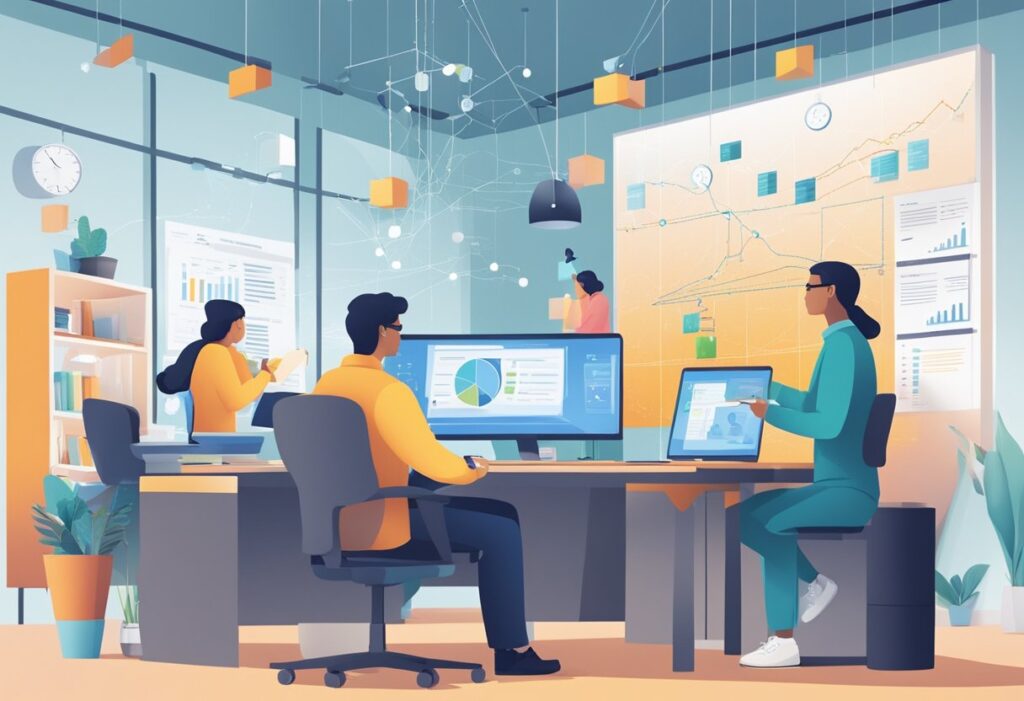
Reskilling and Upskilling
As AI continues to change the nature of work, it is essential for employees to adapt to the new work environment. This means reskilling or upskilling to acquire new skills that are in demand. According to a survey by the World Economic Forum, “54% of all employees will require significant re- and upskilling by 2022” [1].
Organizations should invest in reskilling and upskilling programs to ensure that their employees have the necessary skills to succeed in the changing workplace. This can include training programs, mentorship opportunities, and online courses. By investing in their employees, organizations can improve employee retention, increase productivity, and stay competitive in the market.
The Changing Nature of Work
AI will continue to change the nature of work, with some jobs becoming obsolete while others are created. It is important for employees to understand how their roles may change and what skills they need to develop to stay relevant.
According to a report by Harvard Business Review, “AI is changing work, and leaders need to adapt” [2]. The report suggests that employees should focus on developing skills that are difficult to automate, such as creativity, critical thinking, and emotional intelligence. These skills will become increasingly valuable as AI becomes more prevalent in the workplace.
Organizations should also consider how AI can be used to enhance human skills and collaboration at work, rather than replace them. AI can be used to automate repetitive tasks, allowing employees to focus on higher-level tasks that require human skills. This can lead to more efficient and effective work, with AI and humans working together to achieve common goals.
Overall, it is essential for employees and organizations to adapt to the changing nature of work brought about by AI. By investing in reskilling and upskilling programs and focusing on developing skills that are difficult to automate, employees can stay relevant and succeed in the changing workplace.
References:
- World Economic Forum. (2020). The Future of Jobs Report 2020. https://www.weforum.org/reports/the-future-of-jobs-report-2020
- Harvard Business Review. (2020). AI Is Changing Work — and Leaders Need to Adapt. https://hbr.org/2020/03/ai-is-changing-work-and-leaders-need-to-adapt
Ethical and Legal Considerations
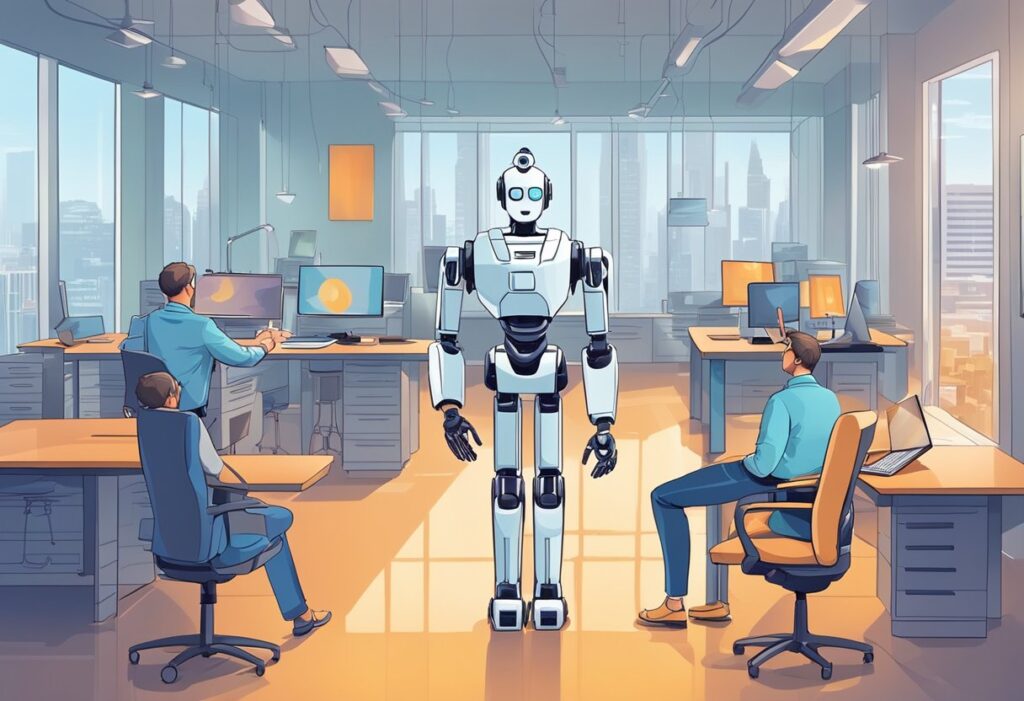
As AI technology continues to advance, organizations must consider the ethical and legal implications of its use. Two critical considerations are bias and fairness, as well as privacy and security.
Bias and Fairness
One of the most significant ethical concerns with AI is the potential for bias. AI systems can learn and make decisions based on data, but if that data is biased, the AI will be biased as well. This can lead to unfair treatment of certain groups, such as minorities or women, in areas such as hiring or lending. Organizations must ensure that their AI systems are trained on unbiased data and regularly monitored for any signs of bias.
To address this issue, some organizations are using AI to detect and mitigate bias in their systems. For example, IBM has developed an AI Fairness 360 toolkit that can detect and mitigate bias in AI models. Other organizations are taking a proactive approach by involving diverse teams in the development and testing of AI systems to ensure that they are fair and unbiased.
Privacy and Security
Another critical consideration is the privacy and security of data used in AI systems. AI requires vast amounts of data to learn and make decisions, but this data must be kept secure and protected from unauthorized access. Organizations must ensure that they have proper data governance policies in place and that they are complying with all relevant data privacy regulations.
Additionally, AI systems must be designed with privacy in mind. For example, facial recognition technology can be used for security purposes, but it can also be used to monitor individuals without their consent. Organizations must ensure that they are using AI in a responsible and ethical manner and that they are transparent about how they are collecting and using data.
In conclusion, while AI has the potential to revolutionize the way we work, organizations must consider the ethical and legal implications of its use. By addressing issues such as bias and fairness and privacy and security, organizations can ensure that they are using AI in a responsible and ethical manner.
Future Outlook

Predictions and Trends
As AI continues to advance and become more mainstream, it is predicted that it will have a significant impact on the job market. According to a report by investment bank Goldman Sachs, AI could replace the equivalent of 300 million full-time jobs. However, it is also predicted that AI will create new jobs, leading to a productivity boom.
One trend that is expected to emerge is the rise of “hybrid jobs”, which combine technical and creative skills. These jobs will require individuals to have a deep understanding of both technology and the human experience. Additionally, AI is expected to increase demand for jobs in fields such as data analysis, cybersecurity, and programming.
Preparing for Disruption
Organizations must prepare for the disruption that AI will bring to the job market. This includes rethinking job roles and responsibilities, and investing in upskilling and reskilling programs for employees. Companies must also ensure that they have a diverse workforce, as AI has the potential to perpetuate biases if not developed and implemented with care.
It is also important for organizations to consider the ethical implications of AI in the workplace. As AI becomes more advanced, it will be able to make decisions that were previously made by humans. Companies must ensure that AI is programmed to make ethical decisions and that employees understand how AI works.
Overall, AI is expected to have a significant impact on the job market in the coming years. While it may lead to job displacement, it is also expected to create new job opportunities. By preparing for disruption and investing in upskilling and reskilling programs, organizations can ensure that they are ready for the future of work.

